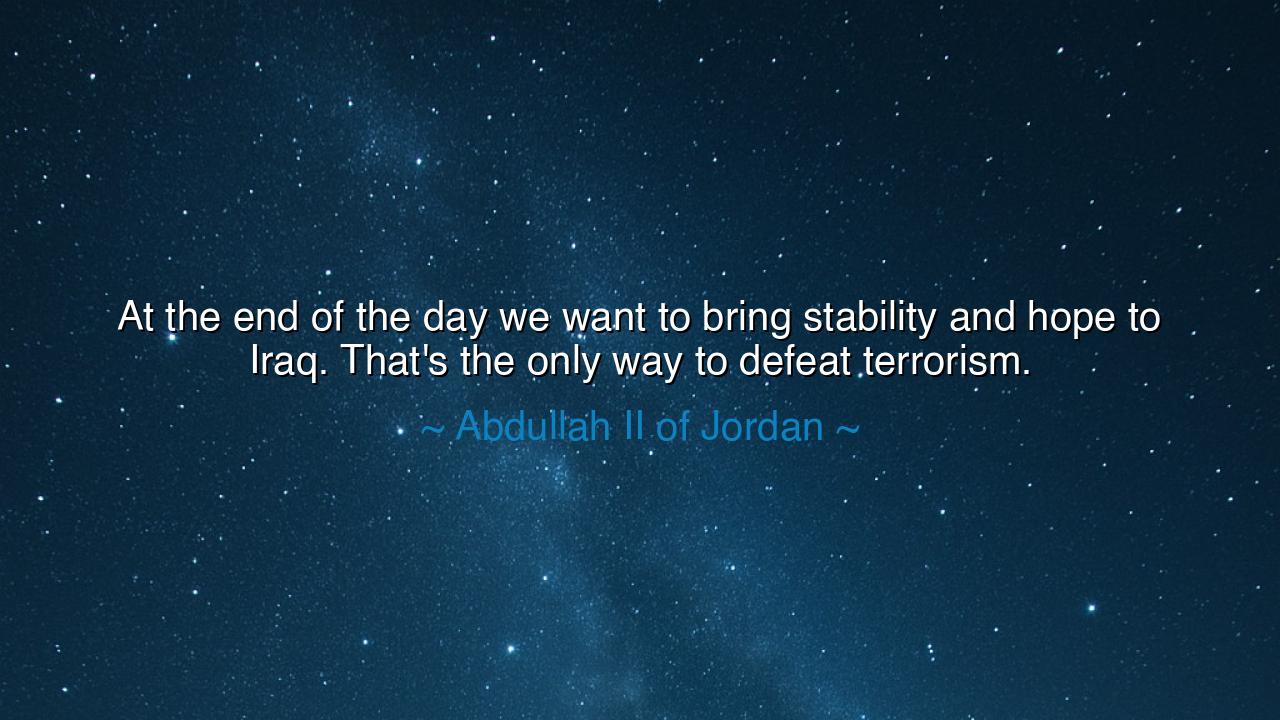
At the end of the day we want to bring stability and hope to
At the end of the day we want to bring stability and hope to Iraq. That's the only way to defeat terrorism.






The words of King Abdullah II of Jordan — “At the end of the day we want to bring stability and hope to Iraq. That’s the only way to defeat terrorism.” — are the utterance of a leader who has seen his region suffer under the shadow of chaos and fear, and who understands a truth as ancient as civilization itself: that violence cannot be conquered by violence alone, and that the deepest wounds of nations can only be healed by the hands of peace, justice, and hope. In this statement, Abdullah speaks not as a ruler of armies, but as a shepherd of souls — one who knows that victory lies not in domination, but in restoration. His words are both political and spiritual, and they echo through the ages like a wise counsel to all peoples who have known war.
To understand the origin of this quote, we must look to its time. In the years following the Iraq War, the Middle East trembled with division and despair. Terrorism was not born from a single ideology but from the ruins of broken societies — from the hunger of the poor, the anger of the dispossessed, and the humiliation of those who felt the world had forgotten them. Abdullah II, himself a monarch whose land sits at the crossroads of conflict and faith, saw that the struggle against terror was not merely a battle of weapons, but a battle for the human spirit. He knew that without stability, people lose trust in the future, and without hope, they become prey to hatred. His words came as a plea to the conscience of humanity: that we cannot kill our way to peace; we must build our way to it.
This truth was known even in the most ancient of times. After the Peloponnesian War, when Athens lay in ruin and bitterness threatened to consume it, wise men such as Solon and Pericles taught that a city can only rise again through justice and reconciliation. When victors humiliate the vanquished, they sow the seeds of future conflict. But when they seek to rebuild, to restore dignity and trust, they plant the seeds of lasting peace. So it is in Abdullah’s words — that only by nurturing life where destruction has reigned can we defeat the despair that breeds violence. Terrorism, after all, is not merely a weapon; it is an illness of the soul, born from hopelessness. To cure it, one must heal the despair that gives it birth.
History gives us another mirror in postwar Japan. After the devastation of the Second World War, many feared that Japan would become a breeding ground for vengeance and extremism. Yet, guided by wisdom and compassion, the world chose a different path. The victors helped rebuild what they had destroyed — schools, cities, faith in the future. They replaced hunger with opportunity, humiliation with dignity, and fear with education. In time, Japan became one of the most peaceful and prosperous nations on earth. This was not the result of vengeance, but of hope. Abdullah II’s words carry this same timeless message: that peace cannot be imposed by the sword, but must be cultivated through the labor of understanding, mercy, and vision.
When he speaks of bringing stability and hope to Iraq, Abdullah reminds us that true leadership seeks not conquest, but harmony. He calls us to remember that stability is not the stillness of fear, but the balance of justice — and that hope is not naïve optimism, but the strength of a people who believe again in their own future. His vision is one of unity over division, where nations are not bound by shared hatred, but by shared humanity. He sees that the defeat of terrorism lies not in annihilation, but in transformation — in giving the young minds who might pick up a weapon a reason instead to pick up a tool, a book, or a dream.
The ancients would have called this the path of the philosopher-king — the ruler who governs not through fear, but through wisdom and compassion. Plato himself spoke of such leaders as those who understand that the strength of a state lies in the virtue of its citizens. Abdullah’s words belong to that lineage of thought: they are a reminder that the truest victory is not over enemies, but over the hatred within ourselves. For when justice reigns and hope is renewed, the seeds of violence find no soil to take root.
Let the lesson, then, be carried into every heart and every nation: peace cannot grow in the absence of hope, and stability cannot be born from oppression. If we wish to defeat evil, we must heal its causes; if we wish to end terror, we must teach compassion. Let each person, in their own sphere — in their homes, their communities, their nations — become a builder of stability, a bearer of hope. For every act of understanding is a blow against hatred; every gesture of kindness, a victory over despair.
Thus, remember the words of Abdullah II of Jordan as the counsel of a wise guardian of his people: that only by bringing stability and hope to the broken places of the world can we truly conquer the darkness of terror. The sword may silence a voice, but only hope can silence despair. And when hope reigns — when men believe again in peace — then, and only then, will the world know victory that endures beyond the battlefield.






AAdministratorAdministrator
Welcome, honored guests. Please leave a comment, we will respond soon